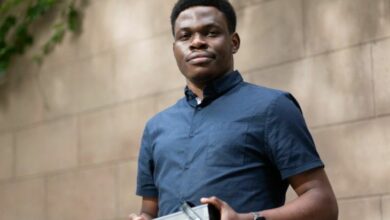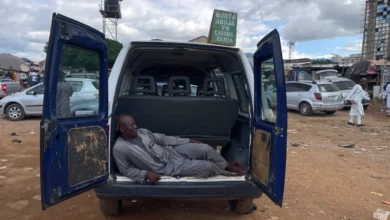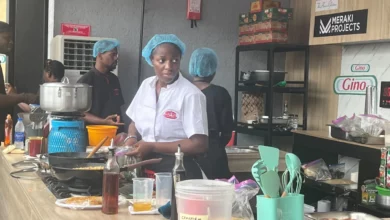MAIDUGURI, Nigeria — Wiping grease onto his t-shirt outside his bicycle repair shack, Baba Gana points to a bomb blast site across the street and explains why this northeastern Nigerian town has sympathy for radical Islamists who terrorize its inhabitants.
Nervous soldiers crouch behind sandbag bunkers and man dozens of checkpoints along the streets of Maiduguri, the capital of Borno state, which sits at the base of the rocky Sahel where Africa's most populous nation borders Chad, Cameroon and Niger.
The remote region has been elevated from obscurity in the last two years by the increasingly deadly Boko Haram, whose name in the local Hausa language translates as "Western education is forbidden."
The sect has carried out dozens of assassinations, shootings and bomb attacks in Borno state this year, often targeting military and religious figures.
A military Joint Task Force (JTF) brought in to stem the violence has suffered dozens of casualties and has dealt out swift and firm retribution. Many local residents have said the JTF does more harm than good and Amnesty International accused soldiers of brutalization, unlawful arrests and rights abuses.
Its commanders deny the allegations but admit some "excesses." Borno residents are caught in the center of the violence and believe the cause of the problem lies not in religious ideology but in resentment at the heavy-handed military and the region's economic isolation.
"I was walking inside the market and there was a huge blast, everyone scattered and ran here and there. Many of my friends are dead," Gana says, describing a deadly blast claimed by Boko Haram in July.
Social injustice
"We have nothing. This has come from poverty. We have been forgotten by the government and now we are terrorized. When the soldiers come we all leave. They go berserk."
The sophistication of Boko Haram's operations has grown. In August it carried out Nigeria's first known suicide attack when a car bomb exploded at headquarters of the United Nations in the capital Abuja killing 26 people.
The attack was the first to target the international community and security experts said it confirmed signs of cooperation with other Islamist groups, including the North African wing of Al-Qaeda. Ties that are difficult to trace.
Global jihadist ambitions are not openly apparent in Maiduguri because Boko Haram does not act as one. While some elements may want to target Western interests in the capital, the majority are still focused on local issues.
President Goodluck Jonathan, a Christian southerner, said last week Boko Haram strikes were "temporary" and like other "terrorist attacks in the world." His statements annoy Borno residents who feel he is disconnected from the region.
"Boko Haram was a result of social injustice. The economy, the finances in the hands of a few. The parents of the youngsters who are coerced into joining Mohammed Yusuf had little or nothing," said Shettima Khalifa Dikwa, chairman of the Voters Forum at University of Maiduguri.
Yusuf, the sect's charismatic leader, was killed in police custody in 2009.
"It is more political than religious and it is a solvable. If it escalates it is the fault of the government and JTF. You can't have JTF searching your house, invading your privacy, mistreating people without you having sympathy for Boko Haram."
Shops are boarded up in many parts of Maiduguri and market stalls only sell a few tired looking vegetable after thousands fled this year to escape the violence. Naked children throw fishing nets hopefully into a dried-up river bed which trickles water out toward the arid region around Lake Chad.
Isolation
It is a far cry from the bustling metropolis of Lagos and wealthy oil business in the south or the grand diplomatic homes and towering ministries of Abuja, where international investors flock, hoping of get a slice of the potential gains offered by a southern-driven economy bursting with potential.
Springing up from the rubble are signs that money has been, and still is, available in Borno. The sites of some of Boko Haram's bomb blasts are easily recognizable by a few freshly painted and unused buildings in their place.
Rising out of one dusty side-street is a vast palace, the home of former governor Ali Modu Sharif, where golden gates and marble pillars show the opulence that the inhabitants of Maiduguri, many of whom live on less than $2 a day, so resent.
These feelings were the source of the sect's beginnings in the early 2000s. Yusuf preached to youths an alternative future to the Western education and traditional rules of local government, which he believed had failed them by stealing state funds and leaving Borno impoverished.
Yusuf's warnings went unchecked and violence erupted in 2009 after hundreds were attracted by his rhetoric and promises. Yusuf was killed in police custody that year, heightening suspicion of authorities and gaining support for his cause.
Central Bank Governor Lamido Sanusi said last month that for more than a decade Borno has been known to be Nigeria's poorest state but these problems have not been addressed.
Until the underlying local issues are resolved, the small minority of radical jihadists in Nigeria and in neighboring countries will have an increasing number of disillusioned youths to recruit into their campaign against Western targets.
"Religion or ethnicity are just identity tools that are appropriated to justify violence and express anger. Once the underlying cause is eradicated those things lose their potency," Sanusi said.




